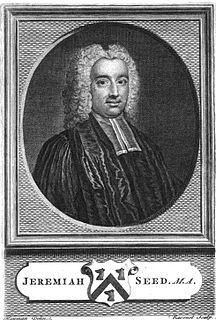A Quote by Richard Hooker
Man doth seek a triple perfection: first a sensual, consisting in those things which very life itself requireth either as necessary supplements, or as beauties and ornaments thereof; then an intellectual, consisting in those things which none underneath man is either capable of or acquainted with; lastly a spiritual and divine, consisting in those things whereunto we tend by supernatural means here, but cannot here attain unto them.
Related Quotes
Though there are very many nations all over the earth, ...there are no more than two kinds of human society, which we may justly call two cities, ...one consisting of those who live according to man, the other of those who live according to God ....To the City of Man belong the enemies of God, ...so inflamed with hatred against the City of God.
Divine Scripture is wont to frame, as it were, allurements for children from the things which are found in the creature; whereby, according to their measure, and as it were by steps, the affections of the weak may be moved to seek those things that are above, and to leave those things that are below. But the same Scripture rarely employs those things which are spoken properly of God, and are not found in any creature; as, for instance, that which was said to Moses, I am that I am; and, I Am has sent me to you."
In this world, perfection is an illusion. Reagrdless of all those who utter the contrary, this is the reality. Obviously mediocre fools will forever lust for perfection and seek it out. However, what meaning is there in perfection? None. Not a bit. ...After perfection there exists nothing higher. Not even room for creation which means there is no room for wisdom or talent either. Understand? To scientists like ourselves, perfection is despair. - Kurotsuchi Mayuri (Bleach 306)
In Philosophy, the contemplations of man do either penetrate unto God, or are circumferred to Nature, or are reflected and reverted upon himself. Out of which several inquiries there do arise three knowledges, Divine Philosophy, Natural Philosophy, and Human Philosophy or Humanity. For all things are marked and stamped with this triple character of the power of God, the difference of Nature and the use of Man.
Men of superior vivacity and wit, when they take a wrong turn, are generally worse than other men: because wit, consisting in a lively representation of ideas assembled together, gives every sensible object those heightening touches, and that striking imagery, which is unknown to men of slower apprehensions: wit being to sensible objects, what light is to bodies; it does not merely show them as they are in themselves: it gives an adventitious colour, which is not a property inherent in them: it lends them beauties which are not their own.
My definition of Blues is that it's a musical form which is very disciplined and structured coupled with a state of mind, and you can have either of those things but it's the two together that make it what it is. And you need to be a student for one, and a human being for the other, but those things alone don't do it.
This gospel has often been spoken of as a way of life. This however is not quite accurate. Consisting as it does of the principles and ordinances necessary to man's exaltation it is not just a way of life, it is the one and only way of life by which men may accomplish the full purpose of their mortality.
He alone is worthy of the appellation who either does great things, or teaches how they may be done, or describes them with a suitable majesty when they have been done; but those only are great things which tend to render life more happy, which increase the innocent enjoyments and comforts of existence, or which pave the way to a state of future bliss more permanent and more pure.
Those that think that wealth is the proper thing for them cannot give up their revenues; those that seek distinction cannot give up the thought of fame; those that cleave to power cannot give the handle of it to others. While they hold their grasp of those things, they are afraid of losing them. When they let them go, they are grieved and they will not look at a single example, from which they might perceive the folly of their restless pursuits - such men are under the doom of heaven.
There are some things which cannot be learned quickly, and time, which is all we have, must be paid heavily for their acquiring. They are the very simplest things and because it takes a man's life to know them the little that each man gets from life is very costly and the only heritage he has to leave.
There is no figure more common in scripture, and none more beautiful, than that by which Christ is likened unto light. Incomprehensible in its nature, itself the first visible, and that by which all things are seen, light represents to us Christ. Whose generation none can declare, but Who must shine upon us ere we can know aught aright, whether of things Divine or human.
There are some arts which to those that possess them are painful, but to those that use them are helpful, a common good to laymen, but to those that practise them grievous. Of such arts there is one which the Greeks call medicine. For the medical man sees terrible sights, touches unpleasant things, and the misfortunes of others bring a harvest of sorrows that are peculiarly his; but the sick by means of the art rid themselves of the worst of evils, disease, suffering, pain and death.




































